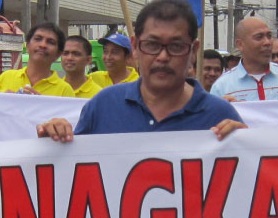Philippines
Sonny Melencio: Asia needs ALBA-style regionalism not US 'pivot' and 'ASEAN integration'

Peter Boyle interviews Sonny Melencio
Philippines: 'Forward, bayanihang sosyalismo!' Popularising a socialism 'with local colour'
The above video presents a summary of the activities of the Partido lakas ng Masa in
Poland: UN climate talks go nowhere -- yet again

By Chris Williams

Typhoon Haiyan bears down on the Philippines.

Assassinated transport workers’ leader Antonio “Dodong” Petalcorin.
Bolivarian Revolution inspires Philippines revolutionaries

PLM members.
By Sonny Melencio

US sailors aboard the aircraft carrier George Washington pre
Philippines left: In wake of Typhoon Pablo, global South demands 'reparations and climate justice'

Typhoon hits the Philippines, December 4, 2012.
By Partido Lakas ng Masa (Party of the Labouring Masses), Philippines
A total ban on all logging and mining activities!
Implement massive reforestation and a sustainable development plan!
Climate justice now!
We demand full reparation from rich countries and their corporations!
December 11, 2012 -- The Partido Lakas ng Masa (PLM) extends full sympathy to the victims of Typhoon Pablo: to the families of those killed and missing, and to the millions suffering from the destruction of their homes and crops and those still waiting for relief. The PLM demands answers to serious questions raised by the government’s response to the catastrophe.
These include: why, despite the authorities warning of the impending disaster in advance, no concrete evacuation plans were in place; evasiveness about the death toll; delays in getting food and other supplies to survivors and diversion of resources to prevent small-scale looting by desperate survivors rather than providing food.
Philippines: PLM welcomes roadmap for peace in Mindanao

Philippines government peace negotiator Marvic Leonen (bottom right) and Moro Islamic Liberation Fro
